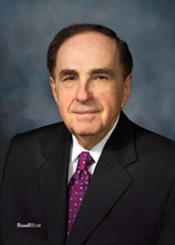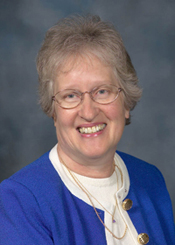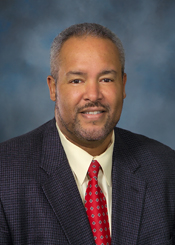 |
Harold M. Maurer, M.D. |
 |
Myrna Newland, M.D. |
 |
Rubens Pamies, M.D. |
“At that time, few women thought to enter medical school,” Dr. Newland said. “Those of us who did focused on getting high grades.”
Fast forward 40 years.
As director of UNMC’s Equity Office, Dr. Newland has seen the number of women increase in medical school as a result of affirmative action programs.
A recent report from the American Association of Medical Colleges shows a steady increase in the number of women medical students. In 1966, graduating medical students who were women totaled 524 or 6.9 percent nationwide. By 2007, women were 49.1 percent of the medical school graduating classes nationwide.
However, a measure currently before the Nebraska legislature would remove the very programs that encouraged qualified women and minorities to seek higher education and other employment options.
State Sen. Mark Christensen recently introduced Legislative Resolution 233 CA, which would prohibit schools and other publicly funded entities from using gender, race, national origin and other factors in admission and hiring decisions.
Chancellor Harold M. Maurer, M.D., expressed concern that the legislation could affect the university’s ability to recruit top talent.
“We continuously seek to bring the best and the brightest to Nebraska to contribute to our world-class image,” Dr. Maurer said. “This amendment could portray our state as unwelcoming of people with diverse thoughts, experiences and cultures.”
“The troubling part of the legislation is that the language is misleading,” said Bob Bartee, UNMC vice chancellor for external affairs. “It appears to be civil rights friendly but it has a devastating hidden impact.”
Rubens Pamies, M.D., vice chancellor for academic affairs, said if passed the effects proposed by the legislation will be far-reaching and disastrous.
“We are training health professionals to work in a global environment,” Dr. Pamies said. “It is critical to the future of health care that all of our students learn not only from a diverse faculty but also from other students with varied perspectives in order to produce culturally competent health care professionals who are ready to provide world-class health care.”
Partnerships with other universities were created to weave cultural competency into the fabric of UNMC, which is part of the chancellor’s strategic plan. Programs, such as the Virginia-Nebraska Alliance, would be greatly affected by this amendment.
|
Historically underrepresented students conduct summer research, gain health care career preparation and collaborate on health disparities research. The program also provides faculty development and exchange programs. If LR 233CA passes, it would restrict UNMC from targeting black students for recruitment to its programs.
Other UNMC scholarships would be affected as well. Several awards are based on donor criteria including preference for males, females and minorities. Those in the College of Medicine include:
- Class of ’63 Distinguished Scholarship (three different scholarships specifically are given to a male, female and minority student);
- Dina Howell Burke Scholarship (preference to a female over 25); and
- The John L. Hoppe Jr. & Leigh B. Hoppe Scholarship (for a female).
“Scholarships and other affirmative action programs have made a significant difference in the UNMC community,” Dr. Newland said. “By opening the doors of opportunity to qualified students and staff, it has changed the lives of women, minorities and their families.”
If the legislative initiative is adopted by voters, it would not only remove affirmative action programs but could have an effect on accreditation.
“The genesis of the Gender Equity committee and annual reports on the number of women and minority students and faculty began with a North Central Accreditation Report in 1987,” Dr. Newland said.
That report led to further studies by the University of Nebraska and a committee of the Board of Regents that resulted in adoption by the board of gender-equity goals and strategies. That ultimately led to a five-year plan to increase the numbers of women and minorities on campus in 1997.
While women are graduating medical school at higher rates than in previous years, they still lag behind their male counterparts in reaching the level of full professor. At UNMC, only 18 percent of the full professors are women. The numbers are even smaller for members of underrepresented minority groups.
Dr. Newland said if passed, the legislative initiative would reverse those positive gains and create a campus that does not reflect the diversity of our community and the world.
“What the civil rights legislation did was allow anyone with the qualifications to get an equal chance of being accepted,” Dr. Newland said. “We had the chance to be there and that has made all the difference.”